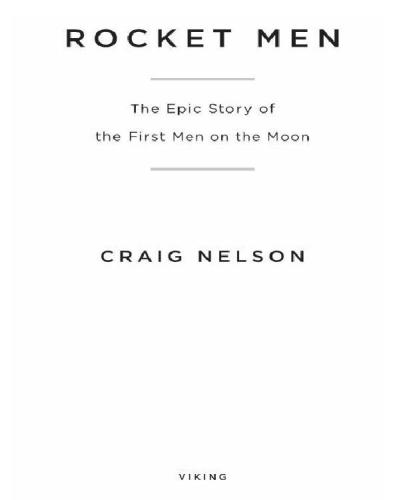
Rocket Men
The Epic Story of the First Men on the Moon
کتاب های مرتبط
- اطلاعات
- نقد و بررسی
- دیدگاه کاربران
نقد و بررسی

Starred review from April 20, 2009
On July 20, 1969, Neil Armstrong first set foot on the moon. In this extensively researched account of that epic achievement, former publishing executive and prize-winning author Nelson (The First Heroes
) moves seamlessly between Apollo 11
astronauts Armstrong, Aldrin and Collins, their nervous families and the equally nervous NASA ground crew. Nelson follows Armstrong in nail-biting detail as he tries to find a place to land with less than a minute’s worth of fuel remaining. A large central section of the book digresses to provide some backstory on the feverish American-Soviet game of one-upmanship in the year leading up to the Apollo 11
launch. For instance, Nelson describes Apollo 8
as an almost reckless gamble by NASA to beat the Russians in sending men to orbit the moon The book also describes the sad personal toll the mission took. Collins was best able to deal with the cost of fame yet expressed the anticlimax of life after Apollo 11
: “I seem gripped by earthly ennui.” Space fans and readers who remember that momentous time will find this an exciting read.

Starred review from June 1, 2009
A thorough recounting—as full in human terms as in scientific and technical detail—of NASA's first manned Moon landing.
Ever since that day, Jul. 16, 1969, when the Apollo 11 mission put its lunar module on the surface of the Moon and astronaut Neil Armstrong took the last long step down its ladder, critics have argued the purpose and strategic value of that incredibly daunting, expensive and risky project. In the capable hands of Nelson (Thomas Paine: Enlightenment, Revolution, and the Birth of Modern Nations, 2006, etc.), however, those arguments simply give way to inspirational history. The event seems strangely remote, something brief and shining—or, as the author quotes one NASA executive,"almost a kind of blip." The author's real achievement is the vivid re-creation of the atmosphere within the program, complete with unsolvable problems, oscillating team morale and serious career envy. For example, astronaut Buzz Aldrin was initially slotted to step first to the surface, but mission commander Armstrong exercised the privilege of rank. The result, the author calculates, negatively affected Aldrin for years afterward. (For more detailed information, see Aldrin's upcoming Magnificent Desolation, 2009.) Nelson also offers lucid insights into the gilded bureaucracy of the space program—NASA's tech-speak often served to isolate the press and public from the complexity of longer odds and much higher risks than outsiders suspected. Nelson capably decodes it as the tale unfolds. He quotes astronaut Michael Collins, who stayed in lunar orbit:"To me, the marvel is that it all worked like clockwork. I almost said,'magic.' There might be a little magic mixed up in the back of that big clock somewhere. Because everything worked as it was supposed to, nobody messed up, and even I didn't make mistakes."
The definitive account of a watershed in American history.
(COPYRIGHT (2009) KIRKUS REVIEWS/NIELSEN BUSINESS MEDIA, INC. ALL RIGHTS RESERVED.)

June 1, 2009
July marks the 40th anniversary of the "Apollo 11" moon landing. This exhaustively researched history by a history writer ("The First Heros") reveals many little-known details about the mission and its astronauts. For example, a recurring problem for NASA was the strong, human-generated odors that permeated its space capsules. The book is also a collective biography of the mission's three astronautsNeal Armstrong, Buzz Aldrin, and Michael Collinsand describes how the intensive press coverage affected their families. The mission changed their lives forever, but, later, the fame brought on problems like alcoholism and divorce. Nelson also devotes major sections to a discussion of the history of rocketry, human space flight, and the Space Race. He closes with a poignant, forward-looking analysis of human space exploration and "Apollo 11"'s place in history. VERDICT Sure to appeal to serious space history fans. [See Prepub Alert, "LJ" 3/15/09; out this month from Harmony is Aldrin's "Magnificent Desolation: The Long Journey Home from the Moon".Ed.]Jeffrey Beall, Univ. of Colorado Lib., Denver
Copyright 2009 Library Journal, LLC Used with permission.

Starred review from May 1, 2009
Using interviews, NASA oral histories, and declassified CIA material, Nelson has produced a magnificent, very readable account of the steps that led to the success of Apollo 11. In the 40 years since the first moon landing and the 52 years since Sputnik was launched, it isnt always remembered now what an experiment the Apollo program was, nor that the space race was as much a military as a scientific campaign. The space program was launched using the knowledge of rockets available at the end of World War II and former Third Reich scientists working in both American and Soviet programs. When it came to sending men into orbit and beyond, routines and equipment had to be invented and tested in minute increments. Nelsons descriptions take us back, showing the assorted teams and how they worked together. We meet the astronauts and find out why they were eager to take on this mission, and we also meet the hypercareful technicians, without whom neither men nor craft would have left the ground. Nelson shows, too, how the technology and the politics of the times interrelated. Leslie Fish, songwriter, summed it up perfectly, To all the unknown heroes, sing out to every shore/ What makes one step a giant leap is all the steps before. Nelson brightly illuminates those steps.(Reprinted with permission of Booklist, copyright 2009, American Library Association.)

























دیدگاه کاربران